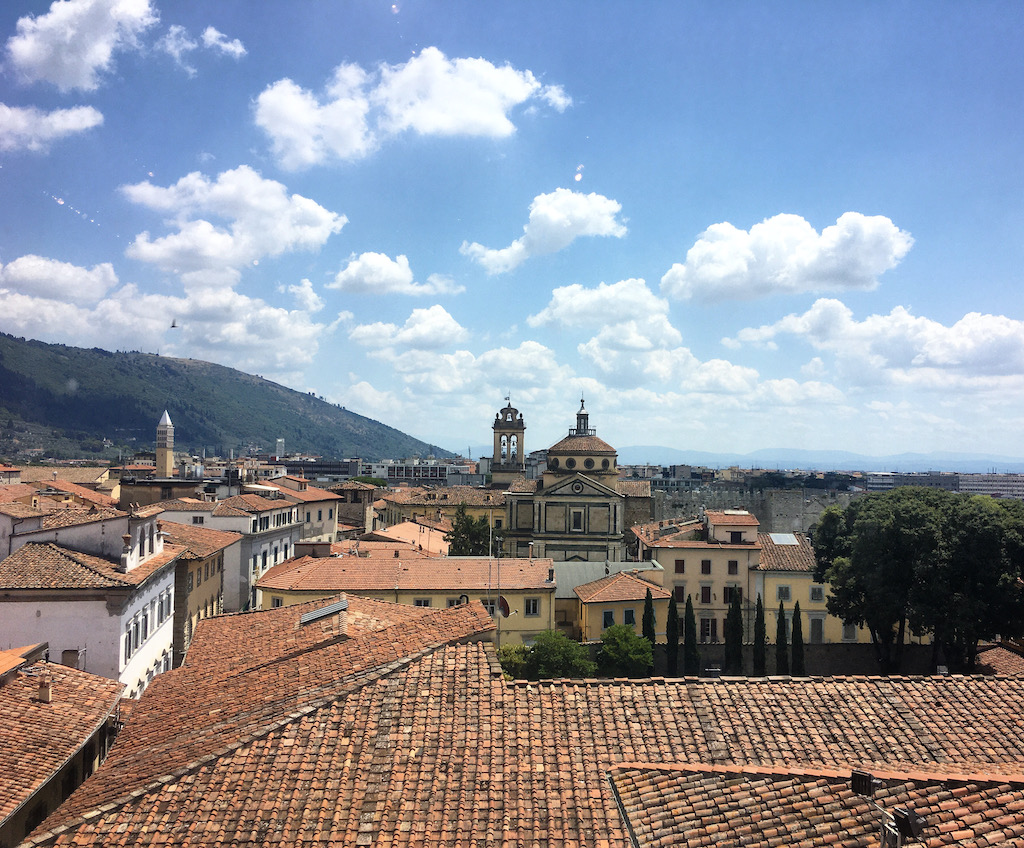“Mom, can I call you back? I’m going to have a coffee with the museum guard.”
“You’re what?”
“Talk later.”
Click. I laughed to myself, imagining her trying to figure out how I could have met someone in the little city I’d been in for less than four hours. But for the last two years or so, it had become commonplace for me to strike up unlikely friendships. It usually occurred with men, often in uniform and always in an unexpected setting.
When I entered a museum, it often seemed as if I had a sign on my forehead. “Start a conversation with me. I’m nice and I clearly have free time!” But I didn’t mind as long as they didn’t linger too long, like the museum guard in the Natural History Museum of Milan, who followed me through the entire exhibit, showing off his knowledge of animal names in English. I had to escape into the bathroom to shake him.
But today, Paolo had simply seen me admiring the view of Prato, a little suburb of Florence, out the third floor museum window. And seeing as I was the only person on that level, he struck up a masked conversation with me, two meters apart.
“Ti piace?” Do you like it?
And so we got to talking. About Prato and Florence. The museums in each city and the way the virus had impacted them. His job as a guard and mine as a copywriter. He was nice until he found out I had a terrace with a view in the city he wished he lived in. Then he spun on his heel in a playful, melodramatic fashion.
“I guess I better go then,” I joked back in Italian, just as two more visitors trickled in.
An hour or two later on the city street, Paolo happened to be passing by as I chatted on the phone with my mom, and in typical courteous fashion, asked me to grab a coffee.
Grabbing a coffee in Italy is the equivalent of taking a shot with someone at a nightclub. It lasts a few seconds. You order. You gulp. You pay. You linger and chat if you want. You don’t linger and don’t chat if you don’t want. It’s not a date. It’s a lifestyle.
Afterwards we went our separate ways, and I got to thinking about my collection of friends in museums, stores, lobbies, and lunch spots.
There was the Zara security guard, who would greet me by saying things like, “hey, I haven’t seen you in a while!” or “we got some new stuff on level three.” Once, he abandoned his post at the ground level door and appeared behind me on the top floor, spooking me a bit, and asking, “are you too hot or too cold?”
It was literally a new level of friendship. Third floor friendship to be precise.
“I’m just right,” I assured him. He nodded and disappeared.
There was my salad guy who ran the cash register next door to my office in Milan, who always asked me random questions that were not salad related. “What’s your favorite football team?”
He had to label each order on the paper bags, and so he knew my name by default. One evening at a bar in the center, he passed by me with his friends, shooting me finger guns and drunkenly yelling, “Megaaaaaan!!!”
At that point, I didn’t know his name, but it was clear that our lunch-exchanges were about to get more interesting. He blushed when I brought it up next Monday, but afterward Alessandro loosened up and we became lunch buddies.
There was Frank who sliced the meat at the same cafe where Alessandro worked, chronically sporting a durag, regularly winking at me and slipping little cookies into my lunch orders.
“Frank left you something,” Ana, the cashier, would say. I thanked Frank. Frank winked.
And then there was Giorgio, my beloved doorman with the slicked back gray hair, dapper mustache, and the Marlon Brando poster in his little lobby office.
Giorgio loved to give me advice and especially liked to make me late for work. Sometimes I would come spilling down the stairs, my heels frantically clacking, praying he wouldn’t try to stop me. As I passed him, I would desperately call out in Italian, “Ciao Giorgio! I can’t talk today. I’m running late!”
In an instant, he would whoosh out of his office, “Ah, you’re late, huh? How come?”
And then it was over. I would miss the tram. But Giorgio’s Santa Claus-like grin and the pure delight he seemed to extract from our morning chats made running late feel somewhat poetic. He talked to me about how he knew the basketball player Galinari, how I had to try the Tuscan chicken next time I was in Florence (or else!), about how I better check my mail one of these days and then bring him back the stamps for his collection.
“I think it’s a letter from your mom. It’s been there for two weeks.”
Missing the tram was worth it for Giorgio.
Having less time for my lunch break was worth it for Alessandro and Frank.
Losing some shopping time or a few minutes of art appreciation was worth it for a goofy interaction with my favorite Zara guard or an unsolicited convo with a museum gallery attendant.
It’s nice to chat with people. To make someone feel like they are wearing the uniform instead of feeling like the uniform is wearing them. To know that you’ve helped brighten up someone’s work day or realizing that they’ve helped brighten up yours.
With just a few honest words, a simple joke, a genuine question, maybe even just a wink, you can make an impression on another human, make the world a little more fun to be in or give someone a story to tell.





